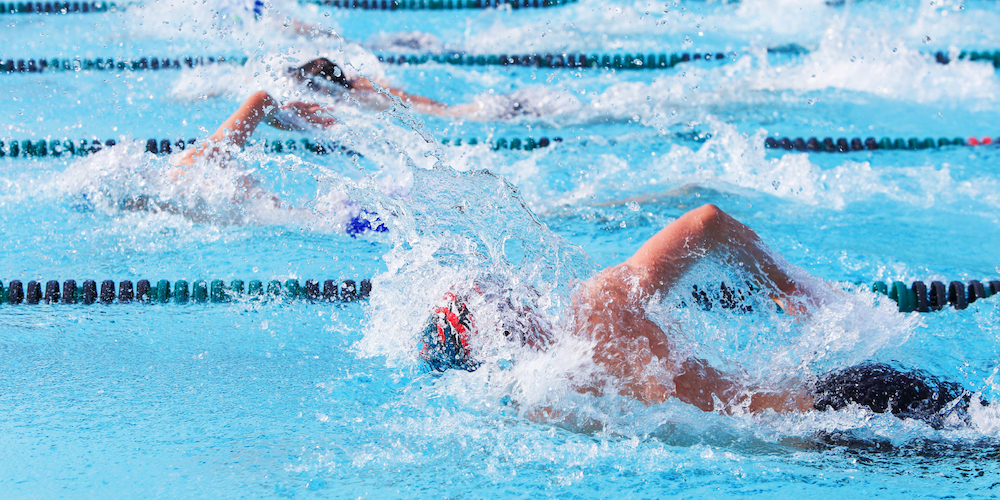Swimming Strong: Nutrition Insights for Youth Swimmers

The Importance of Nutrition for Swimmers
Swimming is a demanding sport that requires endurance, strength, and technique, especially to keep up with all the breathwork. Youth swimmers need a tailored nutrition plan to sustain their energy and optimize their performance in the water. Young athlete nutrition is important for optimizing performance and maintaining health in swimming. It contributes to:
- Energy Production: Swimming requires sustained energy for long practices and competitions, so young swimmers should prioritize carbohydrates ahead of a practice or meet.
- Muscle Repair: Protein is a must to aid in muscle recovery and growth for youth swimmers as the sport can be repetitive in nature.
- Hydration: Staying hydrated is important for maintaining stamina and preventing fatigue, as swimmers often overlook fluid intake due to being in the water.
- Mental Focus: A balanced diet supports brain function, helping swimmers stay sharp and focused during races.
- Injury Prevention: Adequate nutrition can strengthen muscles and joints, reducing the risk of injuries common in swimming, such as shoulder strains like swimming shoulder, swimmers knee and neck injuries.
Key Nutritional Components for Swimmers
- Vitamins and Minerals: A diverse intake of fruits and vegetables can ensure swimmers receive essential nutrients for bone strength and energy metabolism.
- Carbohydrates: As the main energy source, carbs are important for sustaining energy throughout training and competitions. Swimmers should prioritize complex carbohydrates like amaranth, millet, and teff.
- Proteins: Important for muscle maintenance, protein sources such as cottage cheese, quinoa, hemp seeds, and lentils help repair tissues stressed by repetitive movements.
- Fats: Healthy fats from sources like flaxseed oil, walnuts, and sunflower seeds provide long-lasting energy and support hormone production.
- Hydration: Water is important for performance, and drinks with electrolytes can help replenish minerals lost through sweat.
Nutritional Breakdown for a 150-Pound Swimmer
Pre-Performance Nutrition
2-3 hours before performing:
Calories: 500-700 kcal
Carbohydrates: 70-100 grams
Protein: 20-30 grams
Example Meal: Greek yogurt topped with fresh fruit and a drizzle of honey.
30-60 minutes before performing:
Calories: 100-150 kcal
Carbohydrates: 20-30 grams
Protein: 5-10 grams
Example Snack: A small bowl of chia seed pudding with mango.
During Performance
Hydration and Quick Energy:
Calories: 50-100 kcal per hour
Carbohydrates: 10-20 grams per hour
Example: Electrolyte drink or a few slices of kiwi.
Post-Performance Nutrition
Within 30 minutes after performing:
Calories: 200-300 kcal
Carbohydrates: 30-50 grams
Protein: 15-20 grams
Example Snack: A smoothie made with kale, pineapple, and protein.
1-2 hours after performing:
Calories: 500-700 kcal
Carbohydrates: 60-90 grams
Protein: 25-35 grams
Example Meal: Beef lentil stew with sweet potatoes and a variety of colorful vegetables.
Hydration Tips
- Electrolyte Beverages: Beneficial during intense or prolonged activities to replace lost minerals and prevent cramps.
- Water: Encourage swimmers to drink water consistently throughout the day to stay hydrated and maintain performance.
- Hydrating Fruits: Fruits like watermelon and starfruit contribute to overall hydration and provide quick energy.
Healthy Snacks for Sustained Energy
Snacks are important for maintaining energy levels throughout the day, particularly between school, practice, and competitions:
- Roasted Edamame with Sea Salt: Provides protein and fiber for sustained energy.
- Teff Crackers with Avocado Dip: A crunchy snack that offers healthy fats and carbohydrates.
- Coconut Yogurt with Papaya: Combines healthy fats and natural sugars for a refreshing snack.
- Spirulina and Date Energy Balls: Made with spirulina, dates, and nuts for a nutrient-dense snack.
Proper nutrition is important for swimmers aiming to enhance their performance. By focusing on balanced meals, appropriate timing, and hydration, swimmers can improve their energy levels and recovery. Parents play an important role in supporting their young athletes with nutritious meals and snacks, helping ensure they are always prepared to excel in the pool.
For personalized nutrition plans, consulting a sports nutritionist can provide tailored recommendations to meet a swimmer’s specific needs and goals.
Help Protect Your Youth Swimmer
Team up with pomi and dive into reassurance with youth water sports insurance. Whether you’re choosing one of our two coverage options or combining them for extra protection, we can cover your athlete against unexpected twists that come with swimming and water sports!
We do not provide nutrition advice for health or disease purposes. Always consult with your physician before implementing a nutrition plan.

